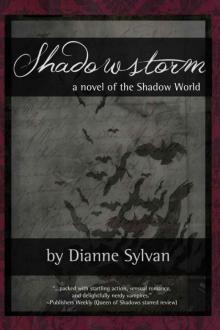- Home
- Dianne Sylvan
Of Shadow Born Page 6
Of Shadow Born Read online
Page 6
She stopped, hands going to her face, unable to breathe through the upwelling of pain in her heart. Oh, God . . . David . . . this can’t be real. I’m going to wake up . . . and he’ll be there, and he’ll laugh at me for crying, and then we’ll make love and go back to sleep . . . oh, God . . . please . . .
Miranda held down her emotions, forcing them aside again. She couldn’t fall apart. There was too much work to do. Later . . . later. Not now.
Stella was installed in a small room a few doors down from the Signet suite; Miranda had made the girl promise to stay put until Miranda returned with a com and guards for her. She knew better than anyone that even the Haven couldn’t keep out every nightmare, but it was better for her to be here than vulnerable in the city—that, Miranda knew, too. Whatever that vampire had been after, even if it had nothing to do with Stella, Miranda wasn’t going to have another death on her conscience.
She resumed walking, headed for the Great Hall, where the Elite were gathering to await their orders. Had it been only a week since the Council had been here? Since she had been shot? No wonder she was so tired. So much had happened so fast . . . did the Council know what had happened? Was Hart celebrating?
She walked out onto the balcony where the staircase opened onto the Hall . . . where a lifetime ago she had walked into battle with Sophie, and time had come to a halt as she and David stared at each other, his eyes full of shock that she was alive and a kind of love she had never, ever expected to find . . .
Not now.
They were waiting for her. Dozens of faces, expectant, tilted up toward her.
At first she didn’t know what to say. There were no protocols for this. She had no script, no idea where to go from here. None of the scenarios that involved a Haven lockdown ended with only the Queen alive. The very idea was absurd. Pairs died together; that was the balance of the universe, the nature of their bond.
She took a deep breath. “Welcome home,” she said.
Applause. She could feel their joy. They had believed her dead, but in defiance of all logic and history, here she was, returned to them again.
“I wish I knew what to say to you,” she told them. “I wish I could tell you that everything can go back to the way it was. I wish I had inspiring words to rally us all . . . to bring some sense of meaning to all of this. But I don’t. That was always the Prime’s department . . . and Faith’s. They should be here now to lead you . . . but they’re gone. They’re gone . . . and we have to go on. To honor what they lived for, and what they died for, we have to be strong and stand together. I don’t know what god or fate or luck kept me here, but I remain. And I’m going to need your help.”
She could see tears on several faces, and her own threatened to rise up, but she swallowed hard and continued. “For now, we’ll adhere to Contingency Delta Three—modified duty, double patrols—to remind the Shadow World that we’re still here. I’ll be . . . I will take applications for a new Second in Command starting next week. In the meantime, shift leaders report to your lieutenants as usual, and lieutenants report directly to me. Patrol reports on the server as always.” Miranda managed a smile for them and finished with, “I don’t know what the future holds for us . . . but I know we can face it together. Dismissed.”
As one, the entire Elite bowed to her. She nodded back, then said, “Elite Twenty-four and Forty-three—please report for guard duty at the Signet suite. Elite Eighty-one, with me.”
Elite 81, a muscular dark-skinned man named Javier who had served on door guard duty many times, was at her side in moments. “My Lady.”
“I have a human guest in East Wing room seven who needs twenty-four-hour guard. Coordinate with the other door guards to make sure she is never left alone.”
“As you will it, my Lady.”
“Also—grab one of the housekeeping staff and see to it that our guest’s cat has a litter box and they both have food.”
Elite 81 looked a bit bemused at the order but didn’t question it; he set off for Stella’s room without comment.
“My Lady, as your medic, I must insist you go and get some rest,” came another familiar voice.
Miranda smiled. “Hi, Mo.”
His warm eyes were sympathetic, though his tone was stern. “You will not do much good for anyone if you fall over from exhaustion.”
Miranda looked down at herself. She had taken Stella up on her offer of a new shirt, but the black pullover the Witch had lent her was a little baggy and faded; still it was better than a bloodstained shirt full of arrow holes. Stella had washed Miranda’s jeans, bless her, and by some miracle or magic spell the blood had come out of them almost completely. Miranda was clean, but she still must look a fright.
“If you insist, Mo,” she said. “I’ll be in the suite.”
As she had when she went out to hunt, she concentrated only on taking one step and then another until she was back at the door again; now there were guards outside the way there always had been, and she could see light coming from underneath the door.
This time she had to open it.
She stood for a long time just inside the threshold, so many emotions hitting her at once that she went temporarily numb. It was a blessing, really—the numbness enabled her to move, to cross the room to her closet and pull out a change of clothes. She stripped off her shirt and jeans with shaking hands that felt nothing. The shirt she draped over a chair so she could have it washed for Stella. She tugged one of her own T-shirts over her head, put on her well-worn old yoga pants . . . but once the chore was done, she stood still again, staring around her yet not really comprehending the room.
Esther had built a small fire, not so much because of cold as to cheer up the space; she had also tidied things up a bit and turned down the bed.
Everything was so normal . . . as though, if she could turn her head fast enough, she would catch a glimpse of David in her peripheral vision, sitting at his desk or dozing off on the couch. Any minute now he would walk in, shake out his coat and hang it by the door, unbuckle his sword and hang it on the wall . . .
Miranda sank down on the bed, the shaking in her hands spreading up her arms and into her chest. She was so cold all of a sudden. She groped for a blanket with one hand and a pillow with the other, pulling the pillow up to her chest.
Instantly the smell overwhelmed her. Almond-scented soap, warm skin, the scent of wild immortality like the earth itself . . . she gripped the pillow to her, wrapping herself around it, burying her face in it, and the tears finally came.
Her sobs turned to screams, muffled by the pillow, long wails of desolation, her abandonment so complete she could barely draw breath. The sound wasn’t human, was far past hysteria; she screamed, and screamed, her entire being pushed under black water of a new kind, drowning her, stripping everything away from her but a loss she couldn’t understand . . . that she couldn’t survive. She wasn’t supposed to survive it. That one hope of peace had been taken from her, after everything else had been taken . . . what was left?
Gradually, so very gently, she felt something at the edge of her awareness, an offer of warmth given with nothing but love and shared pain. She felt a kiss of energy against her forehead, and that warmth spread through her body, calming the shaking, quieting her sobs. It had a softness to it like a shadow cast in moonlight, and there was something familiar about it she couldn’t place . . . but soon it solidified, and changed subtly into something else she knew . . . healing energy . . . arms around her.
Miranda took a gasping breath. This time she smelled whiskey, cologne, a faint wisp of hair dye, leather . . . and that same immortal edge, only deeper . . . older . . . and infinitely sadder.
She blinked and looked up into the lavender eyes. “Deven?”
He was holding her close, her head on his shoulder, his arms around her tight and protective like nurturing wings. “Easy, love,” he whispered. “Just rest and let me work.”
She closed her eyes and relaxed against him. All questions of blame, of g
uilt, were meaningless now; they had both, she understood now, lost their great love, though in different ways, and no one walking the earth could possibly understand what that felt like except another Signet bearer. His power enfolded her, not taking the pain away—that wasn’t in his power to do—but gentling it, giving her enough distance that she could breathe. She would still have to face it, learn to live with the great emptiness inside her . . . but for now, it didn’t claw at her so badly, didn’t leave her bleeding.
She wept still, but the panic was gone. She curled up on her side on the bed, still clinging to the pillow, and Deven lay at her back, his arm around her, his breath warm on her neck. The energy flowed between them, and she felt his mourning as clear as her own. So much pain, and so much guilt . . . he truly believed, she realized, that he was damned, had always been damned, and that all of this was his fault. For hundreds of years he had drifted around the planet afraid to die because he knew what was coming. And then, finally, his faith had died instead of him, and then there was nothing . . . until there was love . . . until it, too, died. David hadn’t been his Consort, but their souls had touched, and loved . . . and lost.
Moments, or hours, later, Miranda turned over, and they lay facing each other like two children sharing a secret. To her wonder, Deven’s eyes were wet, too, and their irises had darkened almost to the color of actual iris flowers.
Deven’s hand lifted and brushed stray locks of hair from Miranda’s face, then cupped her chin lightly, fingers reaching up to wipe the tears from her eyes. The touch was more comforting than she would have believed possible. She had not expected to find comfort anywhere, ever again.
Deven smiled softly. “I remember a night that I came to this same room, to offer comfort in whatever clumsy way I could to a man who had lost the one woman in all the world who fully and completely understood and accepted him.”
Miranda couldn’t seem to stop her tears, but then she decided not to try; she had nothing to hide, not anymore. “I felt him die.”
“I know, Miranda. I did, too. We all did—me, Jonathan, Cora, and Jacob. All of us.”
“Did you . . . see him?”
Deven lowered his eyes, and when he met her gaze again there were more tears. “Yes. Jonathan and I found him on the roof. I brought you his ring and what’s left of the Signet.”
“Did you find his sword?”
“No, but we’re looking for it.”
“Was there . . . anything . . . of Faith?”
Pain creased his forehead again, and he said, “Only the hilt of her sword. Everything else in the room was pulverized.”
She turned her face into the sheets for a moment. Oh, Faith . . . I’m so sorry . . . “Where’s Jonathan?” she asked.
“Debriefing your Elite and ours to get a status report. I didn’t think you would mind a hand with organization for a day or two, just to get you on your feet—Jonathan isn’t much of a warrior, but he’s one hell of a commander in chief.”
Relief, sweet and dark, washed through her. “I’m so glad you’re here.”
Deven looked away again. “Even though . . .”
“Even though.” Now it was her turn to touch his face. “Whatever you did, you did because you wanted to save us. It was batfuck stupid, yes, but I can’t hate you for acting out of love.”
The Prime looked at her as if she were some rare bird that had ventured into the yard. “He always said you had a blind spot when it came to me, but he never understood why, given . . . what happened between us.”
“It’s not a blind spot, Deven. My eyes are very much open. I see you. He . . . it’s hard to explain to people who don’t have this gift, but things like blame and forgiveness have a whole different meaning. I can’t hold on to hate or it will poison me. And there’s something . . . something connecting us . . . all of us. You know that. We’re more than just friends and allies, all of us.”
“I never wanted any of this to happen,” he whispered, unable to meet her eyes any longer. “I never wanted to hurt anyone. When I found out about you, I sent Sophie, thinking I could set things right with him, help him be happy . . . and after all of that, he’s . . .”
“I know,” Miranda whispered back. “I want him back, Dev . . . I want him in my arms. None of this makes any sense without both of us here. It’s just not right. I . . . I don’t know what to do, Deven. What am I supposed to do?”
He reached for her again, pulling her close, and again she was surprised at how safe she felt in his arms, above and beyond the thought that he could easily disembowel anyone who tried to hurt her without breaking a sweat. He just felt . . . something about him . . . she wished she knew what to call it, but the closest word she knew was holy. Strange that things between them had changed so much since they’d met.
They settled into the pillows quietly, as morning rose from the ashes of the night, and between her absolute exhaustion and the gentle waves of energy he kept bathing her with, Miranda drifted off into sleep, feeling safe—not just that, feeling loved—for the first time in many days.
* * *
A week of nights seemed to float by in a watercolored blur. Miranda slept, woke, fed, and moved from one activity to another in a dream state, listening to Jonathan’s advice about reorganizing the Elite, letting Deven fill her in on what they’d learned about Jeremy Hayes, hearing the patrol leaders report on the continued quiet that held Austin in its fragile hands. She barely remembered, from moment to moment, what she was supposed to be doing and could hardly carry on a conversation for more than a few minutes without her attention simply . . . fading away.
Deven and Jonathan watched her falter and decided between them, without even having to discuss it, that Jonathan would manage the military and Deven would manage Miranda herself. Back in California Jonathan was the one to whom their Second reported; Deven had to split his time between the Haven and the Red Shadow, so it was easier to let the Consort handle organization and leave things like weapons training to Deven.
It would take Jonathan only a few days to establish a temporary new chain of command for Miranda that could run without a Second for the near future; the choice of a Second wasn’t something to rush unless a suitable candidate was already clear, and no one stood out in Miranda’s mind. For now, the best thing was to delegate the Second’s duties to the lieutenants and have them all report to Miranda every night in a group briefing. Once she got a better idea of who might work as a Second, she could shift back to the old way of running things.
They were lucky David had organized everything so relentlessly; the outer cities of the territory could continue to run without any changes, except that they reported to the Haven lieutenants now instead of to Faith. David had structured his Elite with care so that they didn’t need micromanagement on his part, and as far as Deven could see he had chosen his second tier of lieutenants very well. If Miranda was very lucky, there wouldn’t be too much trouble.
As the nights passed, however, Deven began to realize that lucky was not a word he would use to describe the surviving Queen . . . in fact, neither was survivor.
Had she been a human woman, the loss of her husband so suddenly and so young would have likely destroyed her, at least for a year or more; she was entitled to her mourning, and no two people grieved on the exact same timeline. But she was Queen, and the Signet would not wait for her to recover.
All Deven wanted was to be sure she could stand on her own. He couldn’t bring David back; he couldn’t ease the great emptiness that constantly threatened to suck Miranda down into its hungry mouth; all he could do was take care of her, offer her the kind of solace he knew she needed, and pray—pray! him!—that somehow, Miranda would make it through this.
The next night he found her at her piano, her head bowed and resting on its shining lid, her fingers resting on the keys but not playing, her eyes closed but not sleeping.
“Am I needed?” she asked when she heard him enter the music room.
“No,” he replied. “Not jus
t now.”
He sat down next to her on the bench. “Were you playing?”
She shook her head. “Sometimes I just come and sit here. She and I understand each other.”
Deven laid a hand on the piano’s lid. “I understand.”
Miranda raised an eyebrow. “Do you?”
He smiled. “I lived in medieval Ireland, remember? I come from the time of wandering bards who were magically bound to their harps . . . back when it’s said the Faery folk still lived among mortalkind. Mothers had to hang charms over their children’s cradles lest the babes be snatched away, an Elf-child left in their places.”
Miranda looked at him curiously. “Is that where you came from?”
His stomach clenched, and he started to snap at her the way he had Jonathan for asking something similar, but Miranda seemed to recognize she’d put her foot in it, and said, “I’m sorry . . . I just meant . . . healers can’t be that common. I bet someone had the idea, back then, that you weren’t . . .”
“Human?” he finished for her. The instinctive anger—and fear—that rose up when anyone made mention of the subject of his birth faded back into amusement. “Yes. Why do you think I spent so much time at church? It was the only place I could be alone with God, who loved me . . . or so I thought.”
“So are you . . .” She sighed, shaking her head. “Never mind. I don’t know what I was going to ask, but it probably would have pissed you off.”
He smiled slightly. “It’s all right, Miranda. It isn’t your fault . . . It was a difficult childhood I had, and it never really got much better. My mother died giving birth to me. She was cold and still . . . until the midwife laid me on her breast, and five minutes old, I healed her. Half the village women saw her come back to life. From that moment there were eyes on me, whispers, knowing glances from the priest. My mother was terrified of me . . . the Faery boy, the Elf-child . . . the demon child. You can only be told you’re damned for so long before you start to believe it, even when your soul cries out it’s a lie . . . A dozen voices drown out the single voice of a child.”

 Queen of Shadows
Queen of Shadows Shadowflame
Shadowflame The Agency, Volume IV
The Agency, Volume IV Of Shadow Born
Of Shadow Born Met by Midnight: Shadow World Stories and Scenes, Vol. 1 (The Shadow World)
Met by Midnight: Shadow World Stories and Scenes, Vol. 1 (The Shadow World) Shadow Rising (The Shadow World Book 7)
Shadow Rising (The Shadow World Book 7) Shadowbound
Shadowbound Shadowstorm (The Shadow World Book 6)
Shadowstorm (The Shadow World Book 6) Shadow’s Fall
Shadow’s Fall